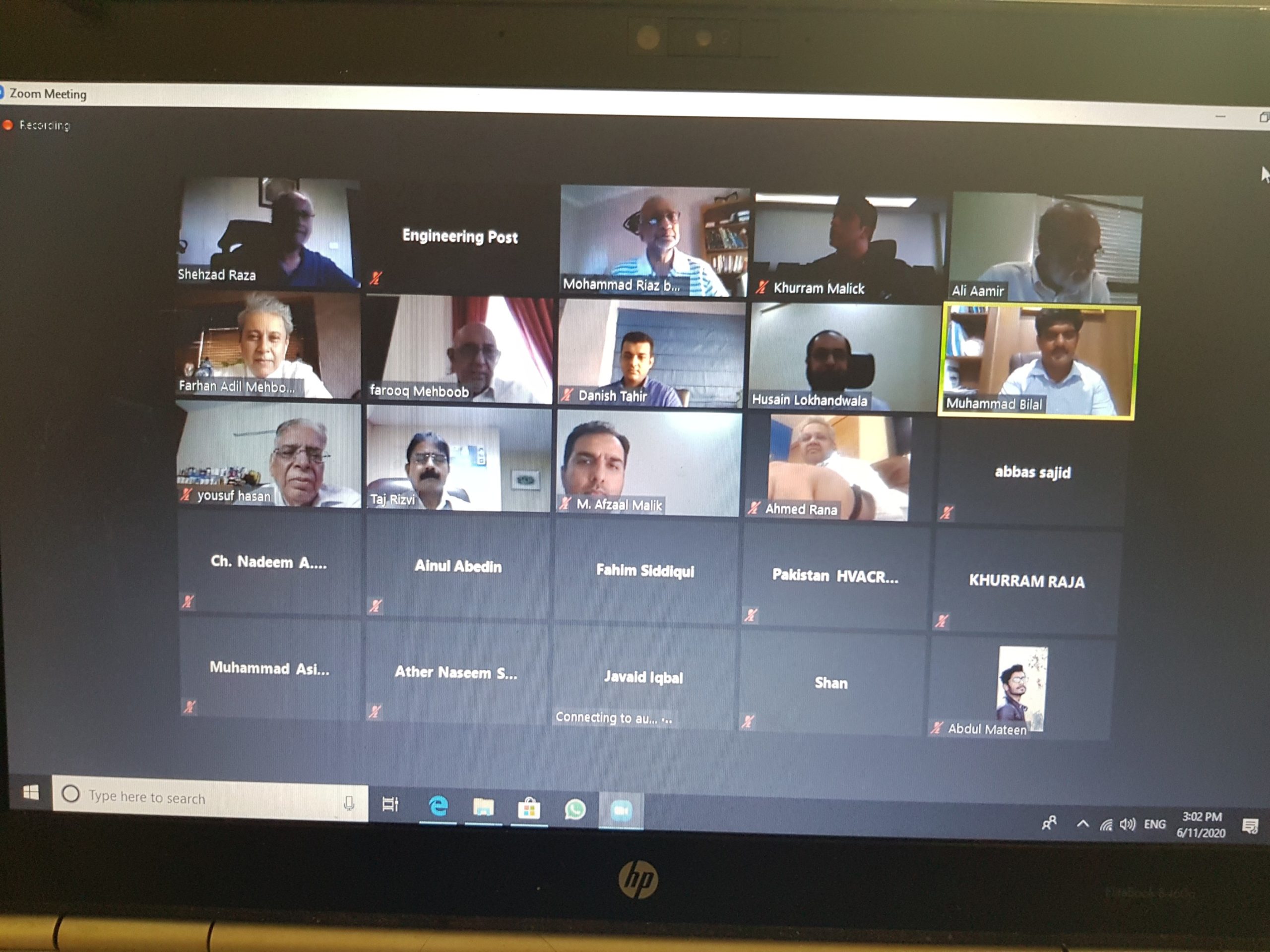Pakistan HVACR society arranged a panel discussion “to address the questions on post COVID-19, HVAC standards, designs & relating problems being faced.” Keeping in view the safety of everyone and to ensure social distancing the meeting was arranged on “Zoom”. Mr. Khurram R Malik and Mr. M. Riaz baig hosted the meeting which started at sharp 3pm on 11-6-2020.
The panel of experts consisted of Mr. Farooq Mehboob, Mr Faheem I. Siddiqui, Mr. S. Shahzad Raza, Mr. Yousaf Hassan, Mr. Ainul Abedin, Mr. Farhan A Mehboob and Mr. S. M. Ali Amir.
The meeting started with Mr Farhan Adil Mehmood sharing brief but informative insights about the current situation of COVID-19, the recommendations of CDC and WHO as well as the stance of ASHRAE regarding preventive measures that need to be adopted to prevent transmission of the virus inside the buildings through HVAC systems.
The discussion was taken forward by Mr Faheem I. Siddiqui who was asked what pragmatic measures can be taken to retrofit the current HVAC installations in normal wards to be used as COVID-19 isolation wards. Mr Faheem Siddiqui provided valuable suggestions based on his experience. The possibility of retrofitting HEPA filters into already installed HVAC systems was ruled out by him because of two important factors.
- Currently installed fans cannot sustain the huge pressure drops created by HEPA filters
- Enough space is not available.
For COVID-19 isolation wards he suggested that even normal Split air conditioners can be used if installed in such a way that negative pressure is maintained and fresh air is introduced to the room from one side and extraction of air is performed from the other side of the room.
“The recommendations of ASHRAE can be complied with in new buildings but they are not practical for old buildings” he said.
Mr. S. M. Ali Amir shared his experience of setting up a quarantine center for COVID-19 patients consisting of 250 beds in 7 isolation wards. He apprised the meeting about how they had built a system of ventilation so that air was collected from the beds and fresh air was provided from the door in such a way that resulted in 4 air changes per hour which is twice than the minimum requirement. HEPA filters and exhaust fans were used in the process. Mr. Khurram malik said that the society will arrange an independent session on which this project will be discussed as it will be a learning opportunity for everyone.
Mr. Ainul Abedin while addressing the meeting said that COVID-19 has shown us our vulnerability to the virus. Now it is the responsibility of every building owner and user to make use of UV in the coil section and drain section in the AHU. This will result in provision of sanitized and clean air preventing not just COVID-19 but also from other harmful microbes.
Mr. Yousaf Hassan gave his insights regarding equipment that can be utilized for air filtration and cleaning including the bipolar ionization technique and UV lamps. “If there is a COVID-19 patient in the building even HEPA filter cannot prevent transmission. We need to follow proper social distancing SOPs.” He also shared with the meeting the problems being face by the industry in the availability of locally manufactured quality products.
Mr S. Shehzad Raza while deliberating on the problem of high consumption of energy in usage of sanitization and filtration system in HVAC systems said that we can prevent high energy consumption by increasing the temperature of the air a little bit. So it remains just comfortable for the patient but does not use a lot of energy and mainly focuses on removing old air and providing fresh air.
Mr. Farooq Mehboob while presenting the concluding remarks said that although ASHRAE standards are good but they are not practical in many ways and need to be applied according to the present situation. “COVID-19 will go away but pandemics will keep coming so we need to construct buildings which are impervious to pandemics and local epidemics”. He pointed out that HEPA filters cannot be used due to pressure drops but we need to ensure 100 percent exhaust from rooms and washrooms. Bipolar ionization needs to be utilized to filter the air and UV for sanitization.
At the end of the meeting President Pakistan HVACR society informed the attendants about the recent activites of the society. He said that a review committee has been formed to ensure that articles are properly reviewed before they are published. Further a Technical advisory committee has also been formed which is working as a bridge between HVACR society and Pakistan Engineering Council to address the issues and to bridge gap between the two establishments.







